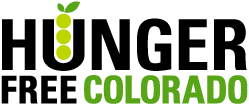
Since the beginning of the pandemic, the rate of hunger in Colorado has tripled. More than 29 percent of Coloradans (1 in 3) are food insecure, meaning they lack reliable access to nutritious food. Parents, people of color, and those living with disabilities face higher rates of food insecurity.
Our survey found:
- 45 percent of households with children are food insecure
- Nearly half of parents worry about covering expenses in the next few weeks or months despite being okay prior to COVID-19
- 38 percent of non-white and Latinx individuals are currently struggling with food insecurity, compared to 25 percent of white Coloradans
- Almost half of those living with a disability are facing hunger, lacking food access due to transportation issues and the high cost of healthy items
Hunger remains a top concern for almost 1 in 5 Colorado households. Compared to the
July survey, food insecurity rates remain steady but our state is seeing some reduction in child hunger.
Slight Improvements Since July
When comparing the results from our two surveys, fewer parents are having to skip or cut back on their children’s meals and their own, (dropping from 23 percent in July to 13 percent in September). We believe this progress is, in part, thanks to the concerted outreach to Colorado families about food resources and vital programs such as universal school meals and Pandemic EBT.
“We’re glad that Congress has continued school meals program flexibilities. This makes it easier for families to provide meals to their children while pandemic-related school closures create barriers to food access for many students. Extending Pandemic EBT through the school year can play a critical role in filling this gap,” said Marc Jacobson, CEO of Hunger Free Colorado. “The next step for Congress is to invest in strengthening SNAP and other nutrition and economic supports. This will help ensure that our neighbors have the support they need until our economy recovers.”
SNAP, the Supplemental Nutrition Assistance Program, is a proven and effective tool to assist low-income households during recessions. SNAP provides eligible recipients with the funds to purchase food at local grocery stores and farmers’ markets. The program helps families get needed nutrition on the table and provides an economic boost for states.
Key Recommendations
Based on these findings, Hunger Free Colorado is calling on Congress to prioritize food assistance in the current relief package. Through mail, phone calls and emails, thousands of Coloradans have joined our call to action. Hunger Free Colorado has the following key recommendations for Congress:
- Increase SNAP benefits by 15 percent and continue emergency SNAP allotments through the economic recession caused by the COVID-19 pandemic
- Continue and improve funding for emergency food systems through the economic crisis caused by the COVID-19 pandemic
- Continue outreach to Coloradans about food assistance programs as many are experiencing food insecurity for the first time
“We need to strengthen the programs that can improve access to nutritious food during this pandemic,” stated Jacobson. “Congress should include these recommendations in the current relief bill as an investment in our communities.”
View the poll findings from September or July and learn about the issue of hunger in Colorado here. We surveyed 550 Coloradans across the state to find out how the pandemic has impacted their access to food and economic security.
